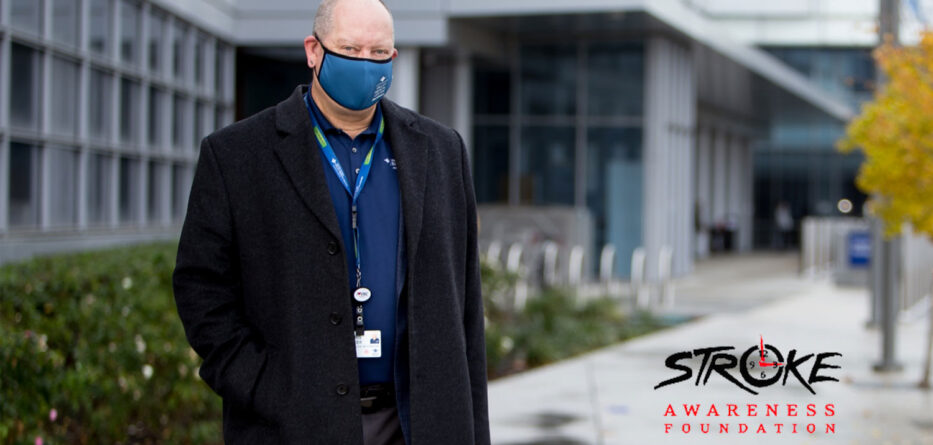San Jose, Calif., June 30, 2022 – The Stroke Awareness Foundation (SAF) will hold a press event on Thursday, June 30th, to announce that Chris Wilder, the powerhouse former Executive Director of the Valley Medical Center Foundation, will join its Board of Directors. Wilder is expected to bolster SAF’s efforts to make sure that life-saving information about strokes – knowing the signs, understanding that stroke is an emergency that requires specialized care, and calling 911 – reaches deep into underserved communities.
In fact, Wilder brings more than an impressive resume to his new role. He suffered a devastating stroke in March 2021 and knows firsthand the value of an early intervention. “My wife recognized the signs right away and called 911. The paramedics who arrived knew that I needed to go not just to any hospital but to an accredited stroke center,” he recalls. “Both of those decisions saved my life.”
The same was true for Chuck Toeniskoetter, who founded SAF after experiencing a stroke himself in 2001. “Recognizing the symptoms of stroke and getting to the right hospital – my survival and recovery hinged on those early determinations,” says Toeniskoetter. “We want to make sure that everyone has the same essential information that can save your life or the life of someone you love.”
Since its founding in 2001, SAF has spread the word about knowing the signs of stroke, created a network of accredited stroke centers, and even developed an app that works anywhere in the United States to help you in case of a stroke emergency.
“Stroke is survivable, but every second counts,” explains Noemi Conway, SAF’s executive director.
Making sure stroke information is available to all is one of SAF’s highest priorities.
Non-English speakers account for half of all strokes in Santa Clara County, and there are often cultural barriers to overcome as well. Conway points out, for example, that many people in non-English-speaking communities aren’t familiar with the signs of stroke and may be reluctant to call 911 or ride in an ambulance. But any delay in treatment can result in a negative outcome.
That’s why SAF has doubled down on its outreach, offering information on its website in six languages and enlisting high-profile ambassadors, like County Supervisor Cindy Chavez, to help convey life-saving information. “The Stroke Awareness Foundation is doing substantial work in Santa Clara County,” she says.
“The Foundation has engaged our community about the warning signs of a stroke and the great progress being made in maximizing recovery from a stroke and getting function back.”
SAF has pumped up its messaging campaign to underserved areas with a $250,000 grant from the Santa Clara Family Health Plan. Building on its successful outreach program to the Hispanic community, which drew an additional 20,000 Spanish speakers to the Foundation’s website, SAF is now expanding its stroke awareness advocacy to the Asian audiences, with a targeted media campaign in Vietnamese and Mandarin.
“We are proud to support the Stroke Awareness Foundation (SAF) in their continuing efforts to combat a leading cause of death and disability. Our shared goal is to ensure everyone has access to life-saving information, regardless of the language they speak,” said Christine M. Tomcala, CEO of Santa Clara Family Health Plan. “We applaud SAF’s initiative to provide culturally competent awareness and education outreach in Spanish, Vietnamese and Chinese, primary languages spoken by many residents of our community.”
Early intervention to treat stroke is critical, but for many, including Wilder, it is just the beginning of what can be a long road to recovery. He is eager to leverage his professional experience to ensure that stroke awareness reaches the broadest possible audience, but he also hopes to inspire others with his own personal journey. “Rehab is hard work,” he declares. “There are some days when you don’t want to do it, but you do it anyway. I’m lucky to have a great team and friends and family who motivate me, but it’s my job to put in the work. That’s the message I got from other stroke survivors and the message I’d like to share, along with the optimism that there are brighter days ahead.”
The Stroke Awareness Foundation’s 11th Annual Fight Stroke Walk will take place LIVE for the first time in two years! Join us on October 23rd at the San Jose Rose Garden for a fun-filled 5K walk connecting stroke survivors, their families, and the stroke care community. This is SAF’s biggest fundraiser of the year with more than 80 sponsors and (pre-pandemic) nearly 1,000 walkers. Enjoy a live band, catered lunch for our sponsors, and the satisfaction of knowing you are supporting a great cause along with a little exercise! Sponsorship opportunities are still available!
Speakers:
Chuck Toeniskoetter
Founder & Chairman of Toeniskoetter Development: SAF Board Member
Cindy Chavez
Santa Clara County Supervisor: Ambassador for the Stroke Awareness Foundation
Chris Wilder
Former President and Executive Director of Valley Medical Center Foundation: SAF Board Member
Christine Tomcala
Chief Executive Officer at Santa Clara Family Health Plan
Bill Baron
Managing Partner, Brandenburg Properties: SAF Board Member
MORE ABOUT THE STROKE AWARENESS FOUNDATION:
For more information, visit the Stroke Awareness Foundation at www.strokeinfo.org. You can also download the Stroke Awareness Foundation app, which helps you quickly identify stroke signs, locates the nearest Certified Stroke Center, and calls 911 while texting your location to your emergency contacts.
For more information about the Stroke walk, go to:
website:






